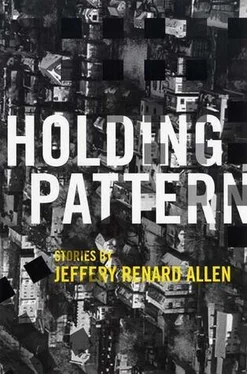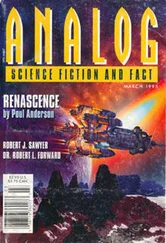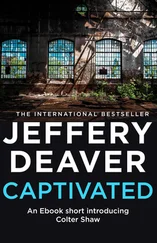But for the grace of God.
Yes. Grace. Miss Bee made signs in the air above her head.
John Brown peeked through the triple-chained crack in the door.
Hatch inched backward. Blunt wanna know if you carry her to town?
Boy, tell Miss Pulliam I carry her. John Brown shut the door.
Hatch ran so fast that he almost fell, his feet twisting against the porch steps. He liked John Brown’s truck, riding up front in the high cab. So he served Blunt the reply, then darted back to the road and waited for John Brown in the truck’s thick shadow. No sooner had he positioned himself against the sun-heated metal than did John Brown appear in his doorway, appear on his ancient porch, rotating the brim of his hat in the circle of his fingers. He set his shoulders broad and moved slow over the cement walk to the gravel road, shirt buttons glowing like bulbs.
Blunt reached the road with her most youthful gait. John Brown quickened his pace — his shoes light — stepping on the very toes, walking on long black knives. He opened the passenger-side door for Blunt and Hatch — Thank you, John Brown — and shut it, with the clang of a lock, after they got in; then he got in himself, the three of them now in the front seat — the only seat — of the truck, Hatch sandwiched between John Brown and Blunt, rigid, perfectly straight. John Brown gave off a fresh rain scent that had soaked deep into his skin. The cab smelled of electrical wires, flaking leather, old rubber, and rust. Hatch’s skin felt tight, the whole world squeezing in. For the first time he hungered for the truck’s square open space, out back. John Brown worked his fingers near the dashboard, and the engine sputtered, the groan of ignition, air from a balloon. Gears screeched for traction, then they set off over the gravel, John Brown’s big black shoe on the accelerator and brake, his long narrow eyes (like string beans — nigger Chinese, Blunt called them) fixed on the road, as steady as headlights, unblinking. He kept the truck at a crawl, both hands on the huge steering wheel, big thunderous tires roaring through the glassy heat of the streets, the truck shivering like a wet dog. The anchor of John Brown’s heavy-shoed foot kept it squarely on the road.
Ain’t seen brogans like that since Moses, Miss Bee said.
Two tugboats, Blunt said.
Two tanks.
Frogs.
Dawgs.
Hawgs.
Dust sifted off the rusted metal in a fine light brown cloud.
Sure is hot, Miss Pulliam.
Yes, suh, Blunt said. You got that right.
Must be firing up the ovens in hell , Hatch signifying to himself.
Like to catch heatstroke. Blunt smiled.
Steam-cleaning the pitchforks.
Hot day like this, no way that monkey come down from that tree. Blunt’s elastic smile snapped and broke.
Miss Pulliam, you know anything bout getting a monkey outta a tree?
Why, no, suh.
Well, I might chunk a rock.
Try one of yo big-ass shoes.
Now, there’s a thought.
Can that monkey drive? Hatch said, subdued.
Blunt’s head spun on her neck like an oiled machine. She gave him an unflinching, icy look.
Boy, John Brown said, you old enough to know that no monkey don’t know nothing bout no driving.
Maybe he got his own car. A monkeymobile.
Boy—
How long you had this truck? Hatch asked.
This truck old as me, and I ain’t no spring chicken. Mo like a lazy winter dog.
How old is that?
Blunt’s eyes swelled at him, red, heavy, ripe apples.
These kids fulla questions. If God wanted young folks to be smart, he woulda made em grown.
They passed a junkyard, overturned cars like playful dogs, paws up.
Now, I got a question for you.
Suh?
You know what a horse is?
Hatch said nothing for a moment. You mean that animal?
Yes. Now, what a horse is?
Suh?
That’s a pig that don’t fly straight.
John Brown’s laughter crashed against the windshield, then thinned out to a few snorts and grunts.
Cold light barely warms him through the moving glass. He sneezes. Fog beginning to curl around the valley. Night coming on hard, the sun dropping low and red through the mountains. The sky grows pink then purple. Trees arrowed off into dark heaven.
And there is more to see. Stars, sparkling teeth. The moon, a fierce white pendulum. Red buzzing traffic and squat houses with fat black iron bars on the doors and windows. City lights on the horizon, earthbound stars. The coach glowing, shadows springing to life.
He applies the wool blanket to his body like a fuzzy second skin. Then the moon swings at him, a bright slice of it cutting cleanly through the window. He feels his head for wetness, for blood.
Boy, come here.
Suh?
Come here.
Hatch did not move.
You gon run off? Well, gon, if you want.
Blood went thick behind his eyes. John Brown awaited him in the tree’s shade. His lined wrinkled body seemed to be cracking, fragmenting, into puzzle pieces of shadow. Hatch was not afraid. He needed to see, he wanted to see. He got down from his bike, slow and deliberate. His feet moved even more slowly over the gravel, as silent as house slippers. He opened the metal latch of John Brown’s gate, entered the yard, and let the latch close behind him with a clanging sound like that of a crowbar against a radiator.
See the monkey?
The day calm and vacant. Full afternoon heat. A few fluffy white buffalo clouds. John Brown’s face and chin jutted up at the tree, his eyes closed. He put movement in his body. Slow, a riverboat — plodding along blindly to some hidden rhythm, bent forward against the still and heavy heat, face blank and empty.
Hatch inched backward.
John Brown stepped from the tree’s shade into bright light, raggedly breathing, as if he had just completed a cross-continental swim. He opened his eyes — sun in the pupils, two horizons — and thrust his face close. To see Hatch better? Photograph his thoughts?
Boy, I ask you a question.
Flying spit peppered Hatch’s cheeks. Words hovered, rising, steamlike, from John Brown’s bright face. An ancient face crisscrossed with stiff wrinkles, rusty rails. The old man’s long rigid finger pointed up into thick foliage, where a wide blade of light slashed through the leaves. Hatch looked in wonder. Squinted into the flaming green.
The sky relaxed. Then he saw it, the monkey. Tiny eyes looking off into the clouds. Shoulders hunched up to its ears. Tail hooked over a branch. A hanging ornament.
The monkey shuddered, stirred.
My God! John Brown said. All gravity lifted from his face. His mouth fell open, unhinged.
The monkey took a deep breath, then extended his wings in the sun, which lit them like screens, put them on display. Hatch could see every tracing of vein — miniature roads — every bumpy muscle, and the delicate framework of bone under the skin. The wings were thin, almost transparent.
With effortless arrogance, the monkey began moving his wings backward and forward — all comfort and ease, the wings light and flexible — a timed and measured fanning that gradually built up to a quick and constant haze that caused the air around Hatch to quiver, his heart to beat without mercy.
I
Few cars and fewer people. The sun perched, hawklike, on a rooftop corner. The sky blue and silent. Hatch gazed into the rich expanse of his shadow and felt challenged. Something flared up inside him. With spring in his legs, he bolted through the strange but familiar constellation of streets. A strong staying breeze, an uneven blowing at his ears. His eyes straining against their sockets, needles pricking his lungs, and the sidewalk grabbing for his ankles. He ducked inside a doorway and sat down hard on the stoop. Head bowed, feverish, he struggled within.
Читать дальше












